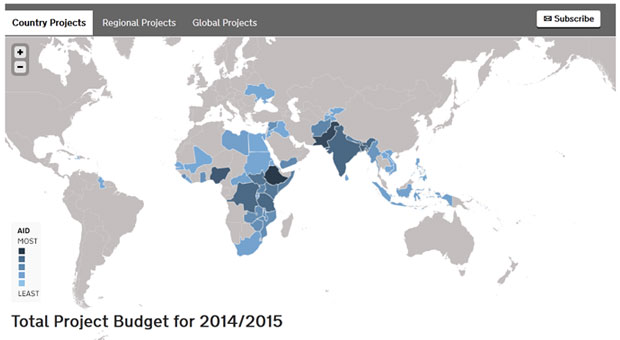
That’s the idea that grips our imagination and takes us and many others to the Open Knowledge Festival in Berlin this week. Browse through the Programme and you'll see why it's going to be a couple of days packed with lightning sessions and chance conversations. Many colleagues working on aid transparency will be there and it will be a fantastic opportunity to meet and share ideas.
The International Aid Transparency Initiative (IATI) has grown significantly in the past couple of years, and we now have over 250 organisations publishing data in this open international standard. With this number of organisations publishing we have been thinking about how IATI could have much more of an impact on users in the following 3 areas:
Access
More than 5 European countries have separately developed a solution to accessing aid data, including the UK’s own Development Tracker. While these are great tools for their intended users, we are in danger of ending up with lots of tools that meet the user needs of donor citizens but don’t address the needs of users in developing countries. What more can we do to make sure that people who need information on international development projects are able to get it in a format that’s easy to access and understand, and is relevant to their needs?

Use
More than 6 global initiatives (sponsored by multiple major global players) are separately running projects to increase open data use in developing countries. In such a crowded field it’s harder to see which user groups (government, civil society and citizens) are being reached and what type of open data (budget, aid, extractives etc) is being used. Are there are any gaps? If so, how can we best fill them?
IATI has made good progress engaging with partner country governments, encouraging and supporting the development of their Aid Information Management Systems (AIMS). But there’s a gap in examples of civil society and citizens using open aid data to address local community needs. The challenge is, how can we stimulate more use of open aid information in developing countries, across a wider range of users that includes not only governments but local groups and citizens?
Evidence
What difference does aid transparency make anyway? Evidence is scarce at this stage and people tend to respond to the evidence gap in a couple of ways. For some, the way to build the evidence is by ‘doing’ – taking open data as a starting point, building capacity in developing countries to use the data more and more through small investigations, experimental events etc. From that the evidence will emerge.
Others favour more of a ‘learning’ approach – taking local community need as a starting point, working with people to build capacity to measure and report change as well as use open data. The danger is we see these as 2 different choices rather than complementary approaches that need to connect if we’re to strengthen support for aid transparency and enhance its impact. The challenge is, how can we generate more and better evidence of the difference aid transparency makes not only to organisations but to services and people’s lives?
Our hope is the OK Festival will be a place where people who recognise these challenges come together and develop ways we can collectively drive faster progress. We look forward to continuing this discussion with you in Berlin.
Keep in touch. Sign up for email updates from this blog, or follow John and Morag on Twitter.

1 comment
Comment by Alan Hudson posted on
Great post John - how about some links to the proliferation of trackers? Then folks can see them on one page which might provide a nudge towards avoiding duplication and enabling potential users to understand each tool.
My new motto. "Open Data: What's your problem"
Or, "I got 99 problems and open data ain't one".